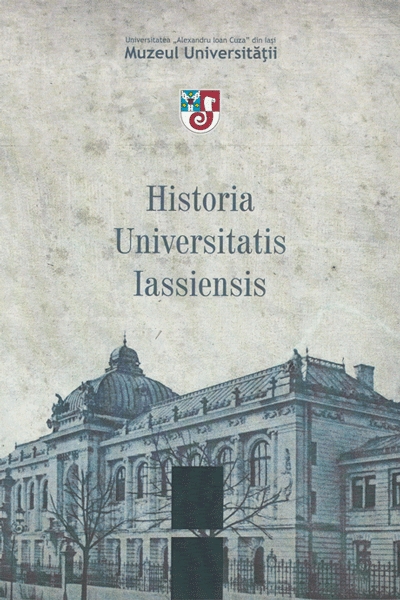Ioan A. Vătăşescu (1897-1980), secretar general al Universităţii „Regele Ferdinand I” din Cluj. Repere bio-bibliografice
Ioan A. Vătăşescu (1897-1980), General Secretary of “King Ferdinand I” University at Cluj. Bio-bibliographic approaches
Author(s): Alexandru PăcurarSubject(s): History, Cultural history, Recent History (1900 till today)
Published by: Editura Universităţii »Alexandru Ioan Cuza« din Iaşi
Keywords: Ioan A. Vătăşescu; University of Cluj; general secretary; purge; autobiography; librarian; Medical-Pharmaceutical Institute of Cluj;
Summary/Abstract: Ioan A. Vătăşescu (1897-1980) follows brilliantly the series of general secretaries of the University of Cluj, after Ștefan Jarda, PhD (1919-1927) and Constantin Jurcan, PhD (1927-1937) performed a meritorious activity for more than a decade (1st of April 1937 – 30th of May 1947). With both parents dying during his childhood, Ioan A. Vătăşescu proved to be thirsty for learning, so that he completed his high-school studies in France, where he also attended university studies of Letters, crowned with a PhD obtained in 1934 at Sorbonne University in Paris. As early as 1922, he entered the Romanian public service, he succeeded by meritocracy to occupy the dignity of General Secretary of the University “King Ferdinand I” in Cluj. He is the author of articles, guides and reports of great expanse, much appreciated. In the heavy moments of the university’s refuge in Sibiu and Timișoara (September 1940) and then at its return to Cluj (summer-autumn 1945), he organized with responsibility these large-scale actions. His professional evolution was woven with that of the University “King Ferdinand I”, knowing an upward evolution until the “decade of collapse” (1940-1950). Acceding to the dignity of the General Secretary during the period of the university’s most extensive development, when the dawn of progress was promising, both personally – he had a family, two daughters, not incidentally named Maria-Lorena and Liana-Dacia – and professionally/institutionally. The University recorded an unprecedented material expansion, like the entire country, and Vătășescu, advanced as General Secretary, devoted himself to its own prosperity. Remarkable is his contribution to the fortification of Latin culture, namely the French one, in Cluj, as well as the fight against increasingly frequent revisionist manifestations since the late 1930, which culminated with the yielding of north-west Transylvania. In the first part of September 1940, he organized the evacuation and refuge of the University in Sibiu and Timișoara, as well as its return to its place in the town on Semeșul Mic river in the summer and autumn of 1945; an extremely difficult process due to the Soviet occu-pation, to the country’s sovietisation and to the exacerbation of proletarian inter-nationalism, which would ultimately be fatal, marking the end of a beautiful career in public service. In this context, he was unfairly dismissed from the structures of the university, in full creative maturity; afterwards, he retreated and practised in Câmpina. In 1954, he had a failed attempt at being hired as a librarian at the Medical-Pharmaceutical Institute in Cluj, which, in his Short Autobiography, describes his professional trajectory. This handwritten document, as well as the discussion with one of his daughters, allowed us to complete his bio-biblio-graphy and to introduce it to the public circuit.
Journal: Historia Universitatis Iassiensis
- Issue Year: 2019
- Issue No: 10
- Page Range: 35-54
- Page Count: 20
- Language: Romanian

